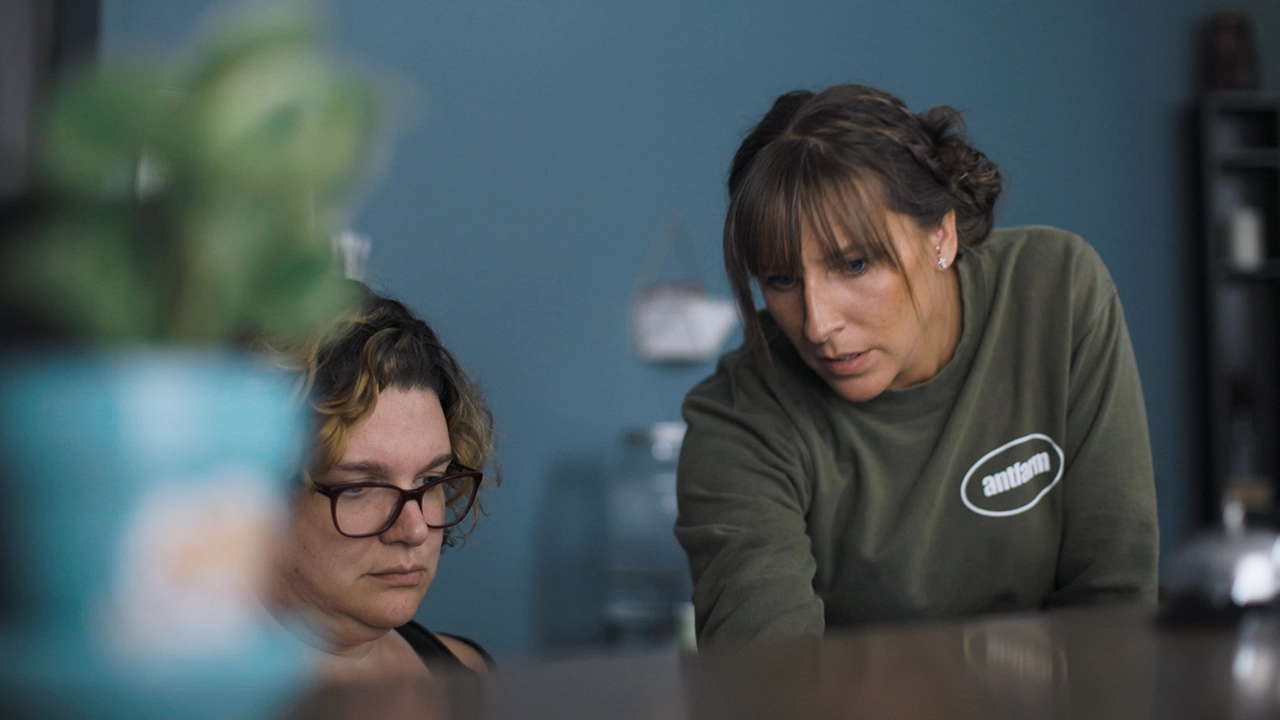Our Stories: Stephanie
A place to call home: Stephanie’s journey from struggle to stability

Stephanie, 39, embodies strength and compassion. After experiencing homelessness for two and a half years, she now dedicates her life to helping others find stability through her work at AntFarm, an Oregon Housing and Community Services-funded, community-driven nonprofit in Clackamas County, Oregon serving youth and families in need.
“I grew up with a single mom who raised over 50 foster kids alongside me,” Stephanie shared. “Our house was always busy, full of love, noise, and chaos. But even with all of that, I always wanted to be a mom who could give her kids undivided attention, something my mom worked so hard to do despite working six days a week.”
Stephanie’s life took an unexpected turn during the COVID-19 pandemic. At the time, she and her husband, Gabe, were full-time students at Multnomah University, living in a church parsonage. When the church struggled financially, they lost their housing.
“We tried to stick it out, believing something would come through, but eventually we found ourselves homeless,” she said.
With their 8-month-old daughter, they moved between motels, family homes, and even their van. Stephanie describes this time as incredibly stressful.
“Finding a place that you weren’t afraid of the police knocking on the window or having people try to break in and when you have an 8-month-old, you’re afraid of her making noise to draw attention,” Stephanie said. “It was really sketchy and scary, any time I heard a noise or anything, I was awake, clutching the baby, like, ‘Who’s coming?’”
This experience led Stephanie to feel down on herself.
“The hardest part was the dehumanizing feeling,” Stephanie explained. “I called places asking for help, but because we weren’t sleeping in an uninhabitable place, we didn’t qualify as homeless. It was frustrating because we were constantly told no.”
Despite these challenges, Stephanie found strength in her daughter.
“She was my joy through it all,” Stephanie said. “I tried to shield her from the fear and stress of our situation. Watching her remain happy and carefree helped me push through.”

Stephanie’s journey toward stability began when she walked into AntFarm looking for volunteer opportunities.
“I wasn’t even looking for housing — I just wanted to help,” she said. “But when they learned I was homeless, they prioritized getting us housed before anything else. By December, we had a home.”
Soon after securing Stephanie’s housing, AntFarm created a position for her as the administrative associate of housing. In her role, she is often the first point of contact for individuals seeking help.
“I think people expect judgment when they walk through the door, but I want them to feel heard,” she said. “I know what it’s like to be in their shoes. I’ve been there.”
The impact of AntFarm goes beyond providing shelter.
“It’s the little things,” Stephanie said. “Having a kitchen to cook in, a space for my kids to play freely, and the ability to sleep next to my husband without feeling like we’re intruding in someone else’s space — it’s life-changing.”
Her time with AntFarm has changed her perspective on homelessness.
“When we look at the homeless population now, we’re seeing more kids whose parents can’t understand who they are and who they’re becoming. And we’re seeing people who are protecting themselves from dangerous situations or less than desirable situations, and that homelessness is the better option. And that says a lot about where they come from,” said Stephanie. “I think that the face of homelessness has really morphed in the last probably five to 10 years.”
Stephanie’s story reflects the broader mission of AntFarm.
“We’re not just helping people find homes; we’re restoring dignity,” she said. “When someone walks in and feels safe, it allows them to let their guard down and start rebuilding their lives.”
Today, she is focused on giving back and helping others navigate their own journeys to stability.
“I hope we can help people so well that one day we’re not needed anymore,” she said. “Until then, I’m here to be a face of hope for anyone who walks through our doors.”
Watch and read more on how the governor’s homelessness emergency response is transforming lives.